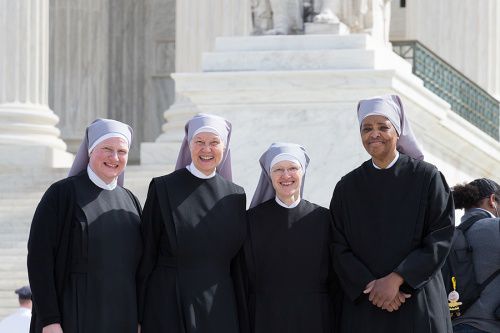If you are a Christian, your life should not be a perpetual Lent — this was the message of the communications director for the Little Sisters of the Poor at a prayer breakfast on Tuesday.
“Don’t let anything rob you of the joy of the Gospel. Dare to be of good cheer,” Sister Constance Veit, LSP, said at the annual National Catholic Prayer Breakfast May 17 in Washington, D.C.
An archbishop had counseled her with those words during the sisters’ ongoing HHS mandate case against the federal government, a case that was sent back to the circuit courts by the Supreme Court on Monday.
The National Catholic Prayer Breakfast has been held annually in Washington, D.C. since 2004, with an attendance of over 1,000. Catholic priests, bishops, religious, and lay leaders all gather to reflect and pray for the country.
Cardinal Robert Sarah of Guinea, prefect of the Congregation for Divine Worship and the Discipline of the Sacraments, was the keynote speaker at the event. House Speaker Paul Ryan (R-Wisc.) and Sister Constance also spoke.
The outgoing Apostolic Nuncio to the U.S. Carlo Maria Vigano was also in attendance. Bishop Paul Loverde of Arlington offered the invocation and Archbishop William Lori of Baltimore said the closing benediction.
In her address, Sr. Constance discussed the importance of joy despite hardship. For several years, her community — which cares for the elderly poor in homes in the U.S. and across the globe — has been threatened by fines that could shut down their ministry if they do not agree to include contraception and similar products in their employer health care plan.
The sisters had been awaiting a ruling from the Supreme Court, and will now wait as the lower court deliberates and comes to a ruling in their case.
But despite the uncertainty surrounding their future, Sr. Constance said, the sisters find joy and peace in following Christ and serving those in need.
She noted that Pope Francis named his encyclical Evangelii Gaudium, or “The Joy of the Gospel,” and his apostolic exhortation Amoris Laetitia, “The Joy of Love.” In writing so much about “joy,” she said, “I think he is trying to tell us something.”
“I believe our contemporaries will listen to us only if we can show them by the way we live that the Gospel brings us lasting joy and happiness. Why follow it otherwise?” she said.
She also exhorted those in attendance to see Christ in all persons. This can only happen, she added, through having an “intimate encounter with God,” as Pope Benedict XVI wrote in his encyclical Deus Caritas Est.
“Going beyond exterior appearances, I perceive in others an interior desire for a sign of love, of concern,” she said. “Seeing with the eyes of Christ, I can give to others much more than their outward necessities. I can give them the look of love which they crave.”
Christians must also not just know the faith, but have faith themselves and trust in God even though life may seem tumultuous, Sr. Constance continued.
“This quiet, yet firm, trust is what will enable us to overcome our natural timidity, our discouragement, or even our just anger in the face of a dominant culture that disrespects our most strongly-held convictions.”
This was the faith and trust of the foundress of the Little Sisters of the Poor, St. Jeanne Jugan, she said, and the sisters still trust in God despite an ongoing lawsuit with the federal government that threatens them with heavy fines if they lose the case.
“When journalists ask me what we will do if we eventually lose our case, I always think of our foundress’ confidence in Providence, and I tell them that we have no contingency plan, because like her, we believe that God will never abandon us,” she said.
In his address, Speaker Ryan also discussed the importance of faith, focusing on the consequences of lacking that faith in the modern world.
“There is a growing need for faith in this nation,” he insisted, pointing to the “epidemic” of opioid abuse in the U.S. as an example. Over 29,000 people died from overdosing on prescription opioids and heroin in 2014, according to the Center for Disease Control, and millions currently abuse opioid pain relievers or heroin.
Having met with people suffering from addiction, Ryan noted that “they feel a deep, gnawing pain inside, and the reason they turn to drugs is to escape that gnawing pain.”
“That pain stems from a loneliness,” he added, but “it wasn’t until you meet a person face to face that you realize that we all feel loneliness at some level. We all feel that distance from God. What is sin but a turning away from Him?”
“It is not enough,” Ryan said, for legislators to come up with economic policies that help the poor and those with addictions, “though we should do that too.” Rather, he stressed, “there is a spiritual void that needs to be filled.”
“When you meet people who have beaten addiction, most of them say something like this: ‘It wasn’t me. It was God,’” he said.
“They know the true source of their success. In their struggles, they have come to know Him. And they have come to find happiness.”

